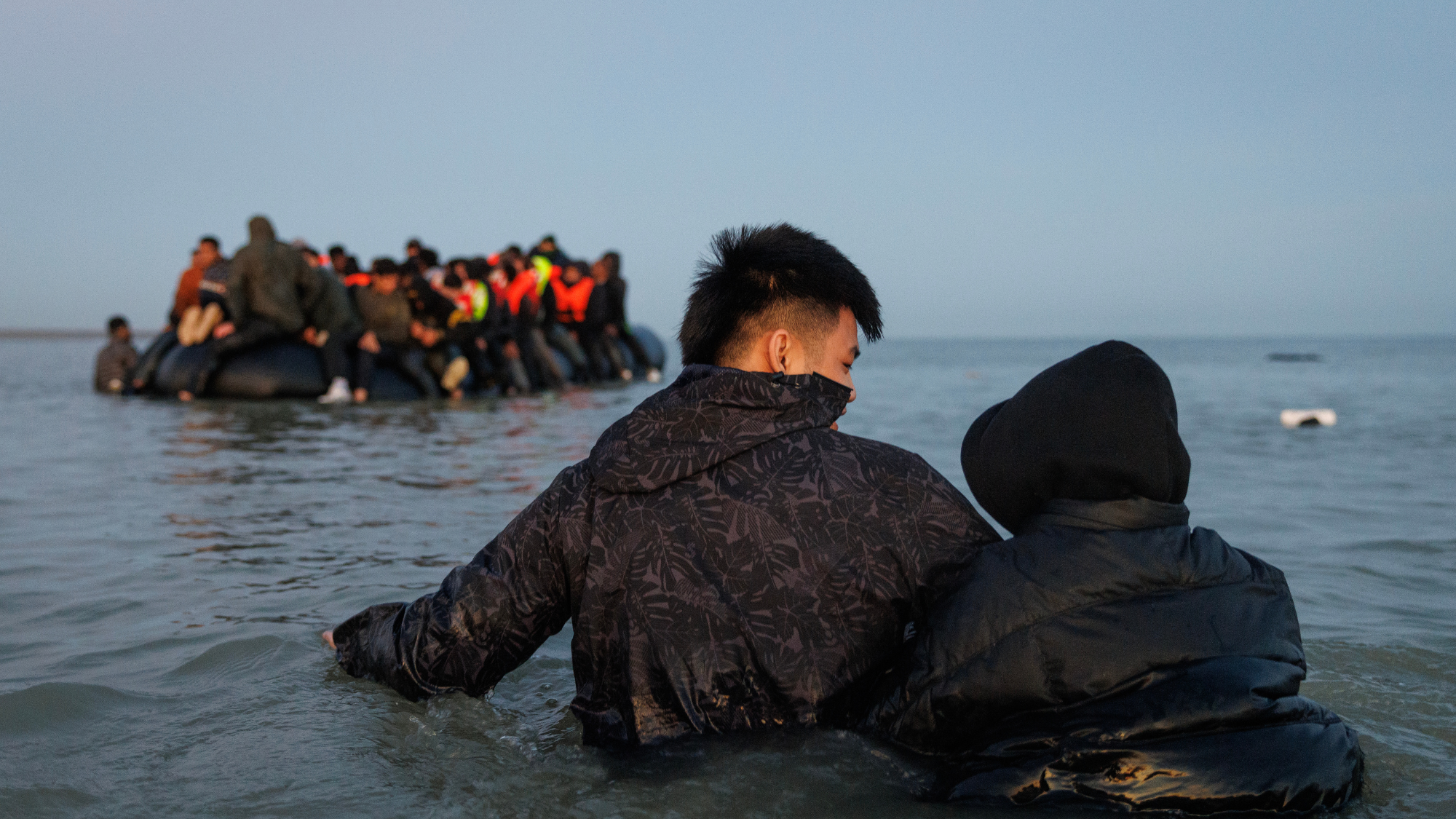BBC suggests Ukip ‘shambles’ as Farage drops migrant cap
‘No more obsessing over caps,’ says Farage, as he ditches party’s call for a 50,000-a-year limit

A free daily email with the biggest news stories of the day – and the best features from TheWeek.com
You are now subscribed
Your newsletter sign-up was successful
Nigel Farage this morning ditched Ukip’s plan to cap UK immigration at no more than 50,000 migrants a year in a move described by the BBC as a shift from “muddle” to “shambles”.
At the weekend, Ukip migration spokesman Steve Woolf said the party was proposing a 50,000 cap. But Farage told Radio 4’s Today programme this morning: “I don’t want us to have arbitrary caps. We are getting rid of caps. We have watched for the last ten days a debate with the government over caps, everybody obsessing about caps.”
Chancellor George Osborne, appearing on the same programme a little later, responded: “Nigel Farage seems to be making it up as he goes along, as much as you can follow his policy. One moment he is talking about a cap, and the next he is ditching it live on air.”
The Week
Escape your echo chamber. Get the facts behind the news, plus analysis from multiple perspectives.

Sign up for The Week's Free Newsletters
From our morning news briefing to a weekly Good News Newsletter, get the best of The Week delivered directly to your inbox.
From our morning news briefing to a weekly Good News Newsletter, get the best of The Week delivered directly to your inbox.
What Ukip would advocate if it were ever to govern Britain – or, a little more likely, share power in a coalition – was laid out in a Daily Telegraph article by Farage published overnight.
Pre-supposing Britain’s exit from the EU, there would be a five-year moratorium on taking in any unskilled workers. Instead, Britain would consider applications for work visas from doctors and other skilled people the country needs, mainly from Commonwealth countries.
They would have to pass an Australian-style points test, overseen by a new Migration Control Commission. They would have to have private health insurance and would have no access to welfare benefits.
Such rigid control would bring net immigration way down from the near-300,000 point it has reached, much to the embrassment of David Cameron who in 2011 promised a reduction by now to "tens of thousands".
A free daily email with the biggest news stories of the day – and the best features from TheWeek.com
“I think it’s very unlikely we would need 50,000 people… the figure will be substantially lower,” said Farage. “Last year there were 27,000 people who came to this country and who qualified under the Australian-style points system, so I don’t think we are going to get anywhere near 50,000.”
In short, immigration would be “returned to normality”.
Farage’s dramatic shift on the numbers cap is not the first time Ukip have “got into a tangle over immigration policy”, as Norman Smith, the BBC’s assistant political editor, put it this morning.
“They got into a kerfuffle at the Rochester by-election when Mark Reckless [the winning Ukip candidate] suggested EU migrants would have to leave to reapply to come here, only to be countermanded by Nigel Farage.
“The danger for them is this moves from a policy muddle story into a shambles story. In other words it becomes an issue about Ukip credibility and how serious they are as a party. That does have the potential to damage them.”
Smith suggested that both Ukip and the Greens are beginning to “sweat a bit” with so much media attention focused on their policies. A general election campaign appeared to be “stretching” parties miore used to the relatively easier matter of fighting by-elections.
-
 The ‘ravenous’ demand for Cornish minerals
The ‘ravenous’ demand for Cornish mineralsUnder the Radar Growing need for critical minerals to power tech has intensified ‘appetite’ for lithium, which could be a ‘huge boon’ for local economy
-
 Why are election experts taking Trump’s midterm threats seriously?
Why are election experts taking Trump’s midterm threats seriously?IN THE SPOTLIGHT As the president muses about polling place deployments and a centralized electoral system aimed at one-party control, lawmakers are taking this administration at its word
-
 ‘Restaurateurs have become millionaires’
‘Restaurateurs have become millionaires’Instant Opinion Opinion, comment and editorials of the day
-
 How corrupt is the UK?
How corrupt is the UK?The Explainer Decline in standards ‘risks becoming a defining feature of our political culture’ as Britain falls to lowest ever score on global index
-
 The high street: Britain’s next political battleground?
The high street: Britain’s next political battleground?In the Spotlight Mass closure of shops and influx of organised crime are fuelling voter anger, and offer an opening for Reform UK
-
 Nigel Farage’s £9mn windfall: will it smooth his path to power?
Nigel Farage’s £9mn windfall: will it smooth his path to power?In Depth The record donation has come amidst rumours of collaboration with the Conservatives and allegations of racism in Farage's school days
-
 Is a Reform-Tory pact becoming more likely?
Is a Reform-Tory pact becoming more likely?Today’s Big Question Nigel Farage’s party is ahead in the polls but still falls well short of a Commons majority, while Conservatives are still losing MPs to Reform
-
 Nigel Farage: was he a teenage racist?
Nigel Farage: was he a teenage racist?Talking Point Farage’s denials have been ‘slippery’, but should claims from Reform leader’s schooldays be on the news agenda?
-
 Five takeaways from Plaid Cymru’s historic Caerphilly by-election win
Five takeaways from Plaid Cymru’s historic Caerphilly by-election winThe Explainer The ‘big beasts’ were ‘humbled’ but there was disappointment for second-placed Reform too
-
 Taking the low road: why the SNP is still standing strong
Taking the low road: why the SNP is still standing strongTalking Point Party is on track for a fifth consecutive victory in May’s Holyrood election, despite controversies and plummeting support
-
 The end of ‘golden ticket’ asylum rights
The end of ‘golden ticket’ asylum rightsThe Explainer Refugees lose automatic right to bring family over and must ‘earn’ indefinite right to remain